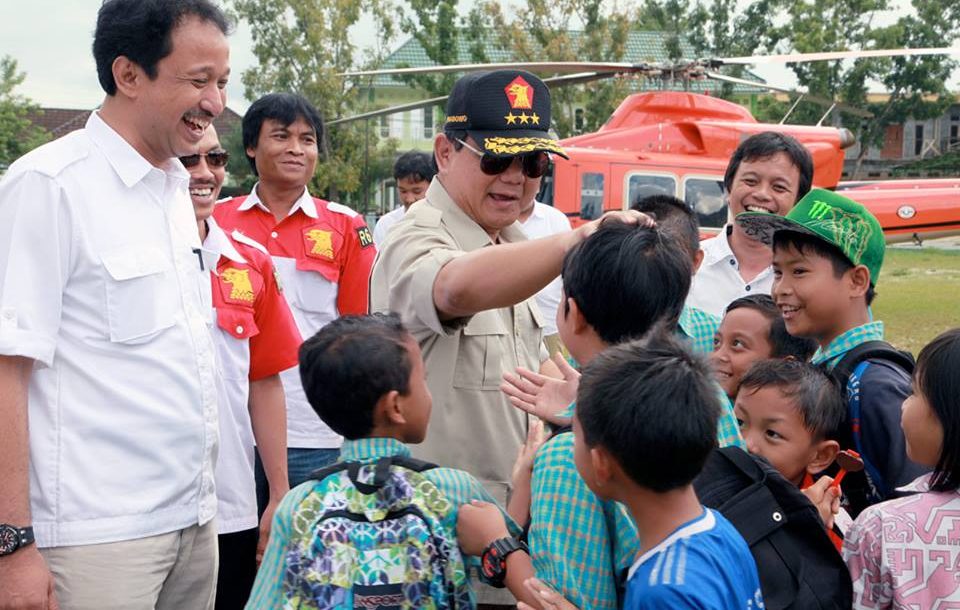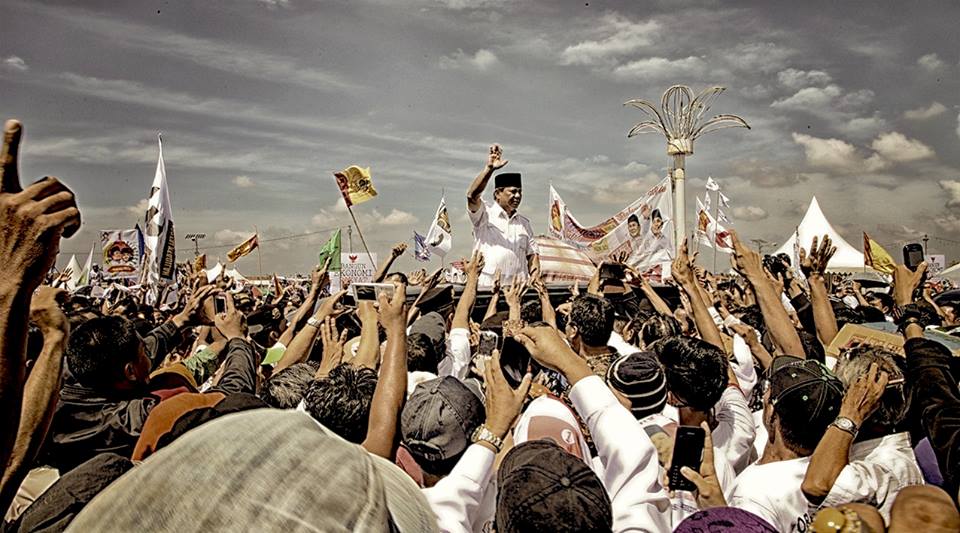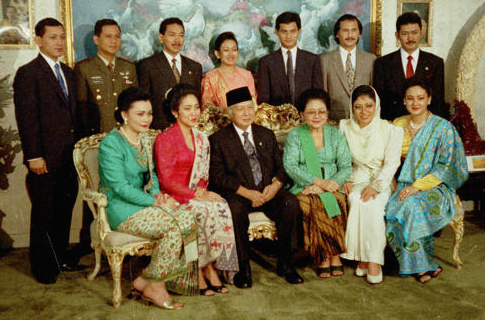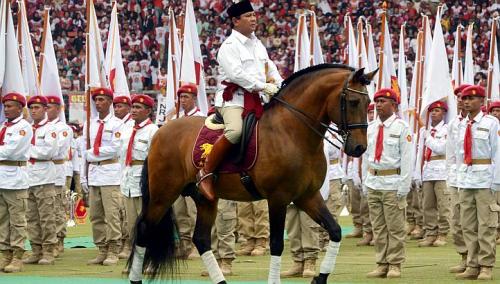Phrases like “turning point” get overused in discussions of politics. In Indonesia in 2014, the term is apt. As the nation gets ready to elect a new president on 9 July, it faces a stark choice that could determine not only the health of Indonesian democracy, but perhaps even whether it survives. The two candidates running in this election embody very different aspects of Indonesia’s recent political history, and they promise to take the country in very different directions.
The leading candidate is Joko Widodo (usually known as Jokowi). Politically, he is purely a product of the new democratic era. A political nobody at the beginning of Indonesia’s democratic transformation, he came to prominence by being elected twice as the mayor of the Central Java city of Solo and then once as governor of Jakarta – a pathway to national power that would have been impossible under the old authoritarian system. Known for a low-key, meet-the-people style of interacting with constituents, he comes from a humble background, though he achieved success as a furniture exporter prior to entering politics. His style of governing emphasises bureaucratic reform, improved service delivery, expanded social welfare services and a consensus-based approach to resolving social conflict.
He would be the first president without firsthand experience of official politics in the authoritarian period and, arguably, the most reformist president yet. While we would not expect dramatic change under his leadership, he would pay patient attention to strengthening Indonesia’s democratic institutions and getting the wheels of Indonesia’s massive bureaucracy turning more smoothly, and more cleanly.
Prabowo Subianto, Jokowi’s only rival in a two-candidate race, has promised to respect Indonesia’s democracy. But there is much in his personal history, his rhetoric, and his political style to suggest that a Prabowo presidency would pose a significant threat of authoritarian reversal. In contrast to Jokowi, Prabowo is one of the purest imaginable products of the authoritarian New Order regime (1966–98) of President Suharto. One of a handful of leading military generals by the time of Suharto’s fall from office, he was the son of an important early New Order economics minister and was married to Suharto’s daughter, Titiek. Prabowo’s younger brother, Hashim Djojohadikusumo, like many of the children of former New Order officials, went into business, while Prabowo was groomed for a career in the army. Hashim is now one of Indonesia’s richest men, as well the chief bankroller of Prabowo’s presidential ambitions. Prabowo himself is also extremely wealthy, living on a luxurious private ranch where, among other things, he keeps a stable of expensive horses. The brothers, it should be noted, have primarily become rich in rent-seeking parts of the economy, such as timber and other natural resources.
In last April’s legislative election, Gerindra achieved 11.8 per cent of the popular vote, but Prabowo was the only other potential presidential candidate who came even close to Jokowi in the public opinion polls. As a result, he was eventually able to pull together a coalition of five major parties to nominate him as its presidential candidate.A year ago, it seemed that Jokowi would win the presidency without serious challenge. He was a media sensation, and his popularity ratings far outstripped other potential candidates. In the last six months, however, Prabowo’s campaign has surged. Though Jokowi still maintains a lead it has narrowed dramatically, and is now in single figures. Nobody now takes a Jokowi victory for granted. In such a context, we need to think seriously about what a Prabowo presidency might mean for Indonesia.
A threat to democracy?
Prabowo is directing his campaign for the presidency through democratic channels. Recently, he has taken pains to state that he accepts Indonesia’s democratic system, and that he intends to preserve it. If he takes power, he will do so with the support of a coalition of political parties that have an interest in preserving democratic participation. He will also be operating in a system that includes robust checks and balances, as well as a strong media and civil society. Why, then, should we be concerned about the implications of a Prabowo presidency for Indonesian democracy?
The obvious reason is Prabowo’s authoritarian past and his personal record of responsibility for human rights violations. During the final months of the Suharto regime, he was in charge of a dirty-war style campaign to abduct anti-government activists, several of whom remain missing to this day. Much of the criticism from Indonesian civil society groups has focused on this aspect, and Prabowo became angry in last week’s televised debate when Jokowi’s running mate, Jusuf Kalla, tried to goad him on the issue.
Another source of concern is explicitly anti-democratic elements in Prabowo’s program. He has repeatedly stated, for instance, that he wants to return Indonesia to the “original” 1945 Constitution, as it was signed in 18 August 1945. In other words, he wants to return to a version of the Constitution that places concentrated power in the hands of the president and removes virtually all the key democratic procedures and controls found in contemporary Indonesian democracy, most of which have been introduced by a series of constitutional amendments since 1998.
Prabowo frequently drops hints, too, that democracy itself, or at least the version that is practiced in Indonesia, is a chief source of corruption and various other ills. In last week’s televised debate he talked about “destructive” democracy and stated he wanted to create a “constructive” democracy instead. He told one gathering of retired military officers last month that democracy “exhausts us.”
The real danger, however, lies in the combination of Prabowo’s emphasis on the leadership principle and what we know about his personality. It’s clear that he views himself as embodying the solution to Indonesia’s many problems and believes that imposing his will is the key to achieving national renaissance. At the same time, his public statements invoke unnamed enemies, and contain implied threats against them or others. (Confronted by journalists, for example, he often doesn’t answer their questions but instead asks what outlet they represent, as if he is compiling a private list of those who treat him disrespectfully.) Add to this already combustible mixture his propensity for flying into violent rages when he does not get his way, and we have every reason to predict that Prabowo could be a president who would be unusually impatient with democratic procedures, and punitive toward political foes.
The first year or two of a Prabowo presidency might go smoothly enough. But after a while, once he started to run into the normal frustrations and compromises that come with democratic life – when he hits a roadblock erected by the parliament, the Constitutional Court, the media, or some other checking institution – it’s all too easy to imagine a President Prabowo invoking emergency powers or taking some other extraordinary method to sweep such obstacles aside. Already there have been reports of active military officers campaigning for him, and it would be relatively simple for him as president to reactivate the army’s “territorial structure” and bring the security forces back into politics.
Of course, a Prabowo government would not be a carbon copy of Suharto’s New Order; Indonesia has changed a great deal since those days and there would be much resistance to any authoritarian reversal. But one important global trend over the last couple of decades has been the emergence of what are sometimes known as electoral authoritarian regimes: systems where elections persist but civil liberties and democratic participation are manipulated to allow the ruling group entrench itself. Think of a place like Putin’s Russia, and we might have a picture of what Prabowo’s Indonesia will eventually look like.
How did this happen?
Of course, it’s not unusual for there to be nostalgia for the authoritarian past, or even a full-fledged authoritarian reversal, a decade or so after a country makes a transition to democracy. Political scientists have for years been speculating that Indonesia was ripe for the emergence of a populist challenger to the existing system. Even so, many analysts of contemporary Indonesian politics – me included – have in recent times adopted a positive take on Indonesia’s democratic achievements. Many things seemed to be going right: the media is robust, civil society is strong, and attempts to wind back democratic space have almost always been defeated by public resistance. Indonesian democracy seemed to be consolidating.
At the same time, deep problems have long been visible and have been the topic of extensive scholarly analysis. Now, some of these problems may be coming home to roost. Even if he doesn’t win in July, the fact that Prabowo is within arm’s reach of the presidency should warn us that that Indonesian democracy is more fragile than many of us were prepared to concede. Shortcomings in three areas seem especially important for explaining Prabowo’s rise.
First is “transitional justice” – the task of investigating and punishing officials responsible for past human rights abuses. Indonesia’s failure on this score has been all but total. After Suharto fell, there were numerous investigations and even some trials, but in the end no senior military officer or other official was found guilty and punished for any of the well-documented human rights abuses that occurred under the New Order. Indeed, one might say that the price the army extracted for getting out of politics was an informal guarantee that none of its leaders would be punished for their past misdeeds. The fact that someone like Prabowo, who a decade and a half ago was so discredited that he had to leave the country, is now able to launch a strong presidential bid is testimony to the consequences of this failing.
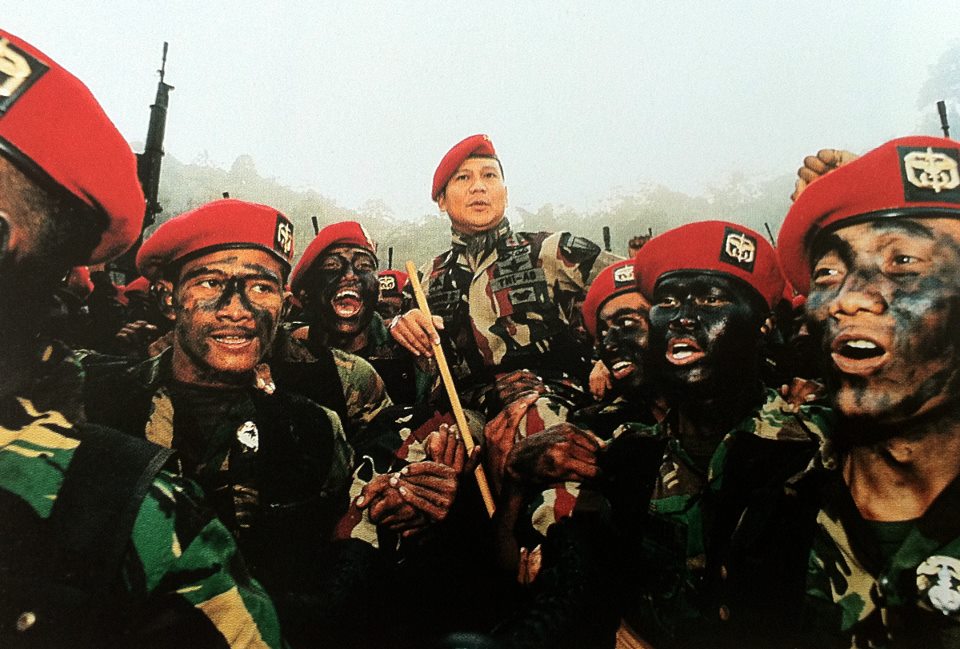
Prabowo during his time as a commander of Indonesia’s notorious Kopassus special forces unit. (Photo: Prabowo Subianto on Facebook)
Second is the breadth and the depth of political corruption. For years now, on almost any day you can open the pages of any major Indonesian newspaper and be assaulted by stories of corruption in haj funds, beef import scandals, land scams, oil smuggling, medical equipment scams, textbook scams, mark-ups in the building of hospitals or sports stadiums – you name it. Those involved include everyone from the highest ministers in the land down to the lowliest town councillors and civil servants. To be sure, much of the media exposure is itself a sign of progress in the fight against graft. Even so, Indonesians would be forgiven for believing that democracy has produced a political system in which virtually everything and everyone is indeed for sale.
Prabowo has made denunciation of this corruption, and of Indonesia’s entire political elite as central to his campaign. As he told a crowd of workers at a rally last May Day: “The Indonesian elite has lied for too long…lied to the people, lied to the nation, lied to itself!” Depicting himself as the anti-political politician he explained:
“We cannot hope for too much from our leaders. They are clever talkers, so clever, so clever that they end up as clever liars! I went into politics because I was forced! I was forced, brothers and sisters! Politics… God help us! Of 15 people I meet in politics, 14 of them are total liars….”
The April legislative elections, which were accompanied by a veritable orgy of vote-buying and electoral manipulation, themselves form an important part of the backdrop to Prabowo’s rise in the polls. No wonder so many Indonesians – especially poor ones – take delight in Prabowo’s denunciations of the political elite and his promises to eradicate corruption through strong leadership, despite his own entanglement in New Order business and patronage networks.
Third, and closely related, is the transactional style of politics that has become central to Indonesia’s democracy. More so than in many countries, official politics in Indonesia has been characterised by what American political scientist Dan Slater calls “promiscuous power sharing”: the propensity of parties with widely differing ideological outlooks or social bases to put aside their differences for the sake of shared access to the patronage resources offered by government.
This system has itself helped to generate the public disillusionment on which the Prabowo challenge feeds, but it has also helped Prabowo build his political coalition. As well as his own Gerindra, four other major parties have fallen in behind his presidential bid: Golkar, PAN, PKS and PPP (the final three are all Islamic-based). There is an authoritarian strain in each of these parties, but one would think that at least some of their leaders would be reluctant to support a leader who threatens a revival of New Order style politics, partly because some of their leaders (especially those of PAN and PKS) were themselves directly involved in the movement to topple Suharto.
More to the point, Prabowo might ultimately threaten the democratic system that has benefited these parties so much. He has successfully wooed them, of course, by offering ministries and other positions of power. (Bakrie for instance, boasted that Prabowo had offered him the previously unheard of post of “chief minister.”) Prabowo has built his coalition by engaging in the very horse-trading and deal-making that he condemns. In contrast, Jokowi refused to cut such deals with potential coalition partners, losing out on support from PAN and Golkar.
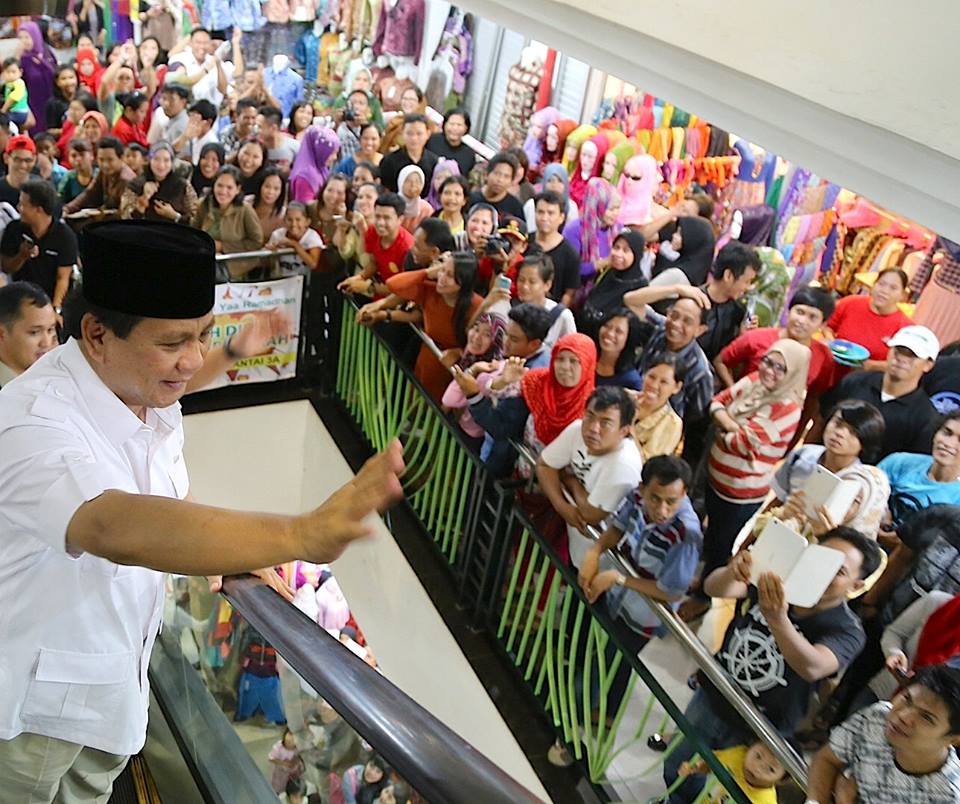
Prabowo during a campaign stop at a market in Makassar, April 2014. (Photo: Prabowo Subianto on Facebook)
This is one just one of the deep ironies – some would say, hypocrisies – of the Prabowo challenge. Prabowo’s campaign is stridently populist, anti-system and anti-elite in its oratorical style. But it is a campaign that has emerged from the very heart of that system and its elite. That contradiction is currently his Achilles’ heel. When he condemns the “political elite” at election rallies, lined up behind him on the stage are party leaders who themselves personify that elite – including some of its most unpopular representatives, such as Golkar’s Aburizal Bakrie. When Prabowo condemns corruption, politically informed Indonesians know that many of the parties and party leaders who now back him are themselves deeply implicated in some of Indonesia’s most notorious corruption cases. In last week’s TV debate, Prabowo said the Indonesian economy had been “wrongly managed”: standing next to him as his running mate was Hatta Rajasa, President Yudhoyono’s coordinating minister for economic affairs. Jokowi’s supporters have been quick to seize on such contradictions, distributing through social media witty postings and images satirising Prabowo and his new alliances.
It is thus far from clear that Prabowo will win. For every voter who finds Prabowo’s angry rhetoric and his promise of strength appealing, there is still at least one more who prefers Jokowi’s low-key affability. Even so, the race is open, and it is momentous. Whatever choice Indonesian voters make, it will be highly consequential. A Jokowi victory will likely allow for continued slow consolidation of Indonesia’s developing democratic system, and it might in fact lead to significant improvement in the quality of the democratic institutions. A victory by Prabowo carries major risks of serious authoritarian regression. The outside world should be worried by this prospect, but the biggest losers will be Indonesia’s own people.
CORRECTION (25 June 2014)
In two places in the above article I suggest that Prabowo’s appeal is likely to be strongest among the poor. Since writing the piece, polling has become available that suggests that it is fact more urban, educated and wealthier Indonesians – in other words, the middle classes – who have shifted earliest and most strongly toward Prabowo. This fact points us toward a reopening of the scholarly debate that occurred in the late New Order regarding the conservative and authoritarian tendencies in Indonesia’s middle classes.
……………
Edward Aspinall is an Australian Research Council Future Fellow and researches Indonesian politics at the Australian National University.
This is an edited version of a longer essay first published at Inside Story.
 Facebook
Facebook  Twitter
Twitter  Soundcloud
Soundcloud  Youtube
Youtube  Rss
Rss 